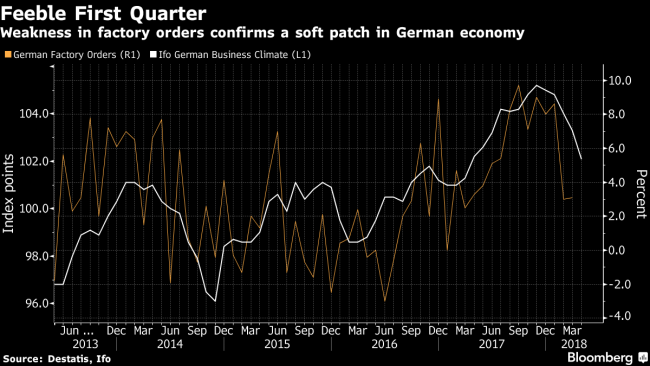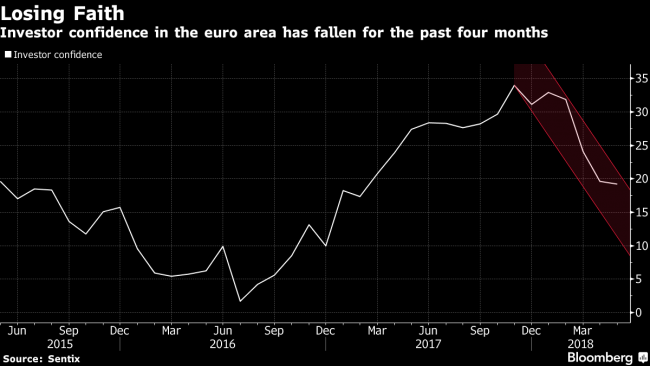(Bloomberg) -- The European Central Bank warned that a rise in trade protectionism would undermine the global economy, and said the U.S. would be among the worst-affected.
The cautionary comments coincide with data showing factory orders in Germany unexpectedly slid for a third month in March, another sign of the weakness that’s dogged the euro-area economy since the start of the year. Separate reports showed investor confidence in the currency bloc fell for a fourth month and a retail gauge suggested that sales contracted for the first time in more than a year.
The ECB has cited tariffs as one of its chief concerns as the institution’s policy makers edge toward the end of their stimulus programs. President Mario Draghi has warned that while the impact of already-adopted protectionist measures is limited, the prospect alone of trade war between the U.S. and China -- two of the bloc’s biggest trading partners -- could damage confidence and reduce consumption and investment.
“In a scenario in which the U.S. increases tariffs markedly on imported goods from all trading partners that retaliate symmetrically against it, the outcome for the world economy would be clearly negative,” ECB researcher Lucia Quaglietti wrote in an Economic Bulletin article published Monday. “The impact could be particularly severe in the U.S.”
The decline of confidence is already sapping momentum from global growth, according to UniCredit research. The bank’s global leading indicator declined to its lowest level in two years in April, signaling the world’s trade is expanding at about 1 percent year-on-year.
Speaking on April 6, ECB Executive Board member Benoit Coeure described a hypothetical scenario in which the U.S. raises levies on all goods imports by 10 percentage points, with trading partners responding with the same measures. This would reduce American growth by as much as 2.5 percentage points in the first year alone.
In the euro zone, an investor confidence index by Sentix fell to 19.2 -- the lowest since February 2017 -- from 19.6. A gauge of expectations is at its weakest since October 2014.
“Uncertainties about the introduction of punitive U.S. tariffs and the danger that this could lead to an expansion of protectionist measures are weighing on us,” Sentix Managing Director Manfred Hubner said in the report.
IHS Markit’s retail purchasing managers index dropped to a 17-month low of 48.6. A number below 50 signals that sales shrank.
The disappointing figures this year prompted ECB officials to hold off from discussions on ending their stimulus measures when they met last month. Still, they haven’t shown signs of panic and are sticking to their view that growth isn’t under serious threat. “Robust” and “resilient” were the words used late last week by ECB Vice President Vitor Constancio.
Likewise, the Bundesbank has so far brushed off concerns about Germany’s outlook, citing exceptional factors including strikes and a flu epidemic. Factory orders slid 0.9 percent in March, compared with a median estimate for a 0.5 percent increase. They’ve now dropped for three straight months for the first time since 2015. Export orders slid 2.6 percent.
A purchasing managers index for April published Friday came in weaker than expected as services activity cooled.
“The German economy has lost considerable momentum since the beginning of the year,” said Ralph Solveen, an economist at Commerzbank (DE:CBKG) in Frankfurt. It should “continue to grow more slowly in the further course of the year than in the previous year, even if the upswing is not yet over.”
(Corrects fifth paragraph to show increase is on trade, not economic expansion.)


